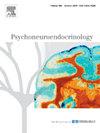英格兰老年人对COVID-19大流行的身体活动、低度炎症和心理反应
IF 3.6
2区 医学
Q2 ENDOCRINOLOGY & METABOLISM
引用次数: 0
摘要
目的:抑郁和焦虑是老年人的一大负担。虽然体育活动(PA)的保护作用已被充分证明,但对PA、低度炎症和心理健康之间的相互作用知之甚少。当遇到新的压力源时,支撑心理健康的生物行为机制可能会变得更加突出,这种压力源在COVID-19大流行期间尤为普遍。利用来自英格兰的全国老年人样本数据,本研究测试了(1)大流行前PA及其在大流行期间的变化是否与心理健康反应相关;(2)与大流行前相比,患有低度炎症的老年人是否经历了更大程度的抑郁和焦虑增加;(3) PA是否减弱了炎症与心理健康的关联。方法本研究使用了英国老龄化纵向研究的数据,这是一项队列研究,追踪了50岁的全国样本 + (N = 5829)。在大流行之前(2016/17和2018/19)以及2020年11月和12月期间收集了有关精神卫生和PA的信息。使用大流行前c反应蛋白(CRP)确定炎症。根据社会人口统计学和健康相关因素以及大流行前的心理健康状况对分析进行了调整。结果从大流行前到大流行期间,PA的增加与抑郁几率的降低有关(OR = 0.955, 95 % CI [0.937;0.974])和焦虑(OR = 0.954, 95 % CI [0.927;0.982])。大流行前较高的PA与抑郁几率降低相关(OR = 0.964, 95 % CI [0.948;0.981])和焦虑(OR = 0.976, 95 % CI [0.953;1.000]),而CRP升高与抑郁症的几率增加1.343倍相关(95 % CI [1.100;1.641])。PA没有减弱炎症与抑郁的关联。结论:研究结果表明,PA可能有助于老年人对压力生活事件的心理弹性,但似乎并没有减轻全身性炎症对心理健康的不利影响。需要进一步的研究来探索这种保护机制背后的心理生物学途径。本文章由计算机程序翻译,如有差异,请以英文原文为准。
Physical activity, low-grade inflammation, and psychological responses to the COVID-19 pandemic among older adults in England
Objective
Depression and anxiety impose a significant burden on older adults. While the protective effects of physical activity (PA) are well-documented, less is known about the interplay between PA, low-grade inflammation, and mental health. Biobehavioural mechanisms underpinning mental health may become more prominent when encountering novel stressors, which were particularly prevalent during the COVID-19 pandemic. Leveraging data of a national sample of older adults from England, this study tested (1) if pre-pandemic PA and its changes during the pandemic were associated with mental health responses; (2) if older adults with low-grade inflammation experienced greater increases in depression and anxiety, compared to pre-pandemic levels; (3) if PA attenuated the inflammation-mental health associations.
Methods
The study used data from the English Longitudinal Study of Ageing, a cohort study following a national sample aged 50 + (N = 5829). Information on mental health and PA was collected before the pandemic (2016/17 and 2018/19) and during November and December 2020. Inflammation was ascertained using pre-pandemic C-reactive protein (CRP). Analyses were adjusted for sociodemographic and health-related factors and pre-pandemic mental health.
Results
Increasing PA from before to during the pandemic was linked to reduced odds of depression (OR = 0.955, 95 % CI [0.937; 0.974]) and anxiety (OR = 0.954, 95 % CI [0.927; 0.982]). Higher pre-pandemic PA was associated with reduced odds of depression (OR = 0.964, 95 % CI [0.948; 0.981]) and anxiety (OR = 0.976, 95 % CI [0.953; 1.000]), whereas elevated CRP was associated with 1.343 times higher odds of depression (95 % CI [1.100; 1.641]). PA did not attenuate the inflammation-depression association.
Conclusions
The findings suggest that PA may contribute to psychological resilience against stressful life events among older adults but does not appear to mitigate the adverse effects of systemic inflammation on mental health. Further research is needed to explore the psychobiological pathways underlying this protective mechanism.
求助全文
通过发布文献求助,成功后即可免费获取论文全文。
去求助
来源期刊

Psychoneuroendocrinology
医学-精神病学
CiteScore
7.40
自引率
8.10%
发文量
268
审稿时长
66 days
期刊介绍:
Psychoneuroendocrinology publishes papers dealing with the interrelated disciplines of psychology, neurobiology, endocrinology, immunology, neurology, and psychiatry, with an emphasis on multidisciplinary studies aiming at integrating these disciplines in terms of either basic research or clinical implications. One of the main goals is to understand how a variety of psychobiological factors interact in the expression of the stress response as it relates to the development and/or maintenance of neuropsychiatric illnesses.
 求助内容:
求助内容: 应助结果提醒方式:
应助结果提醒方式:


